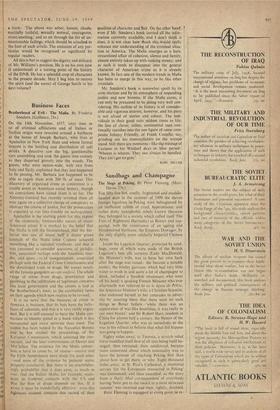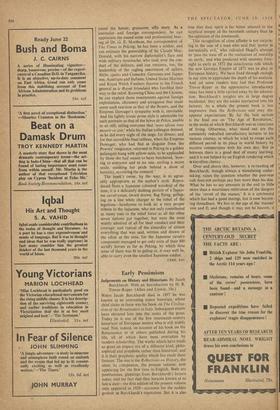Sandbags and Champagne
Foil fifty-five hot, smelly, frightened and muddle- headed days in the summer of 1900 the eleven foreign legations irk Peking were beleaguered by an inefficient rabble of cruel, superstitious, and rather dotty xenophobic rebels known (because they belonged to a society which called itself The Fists of Righteous Harmony) as Boxers and with the connivance of an ageing and bloodstained battleaxe, the -Emp the only slightly more soldierly Imperial Chinese Army. Inside the Legation Quarter, protected by sand- bags, some of which were made of the British Legation's best silk curtains (Lady 'MacDonald, the Minister's wife, was to have her own back after the siege was raised: she became a notable looter), the motley garrison, which had very little water to wash in and quite a lot of champagne to drink, included a Swedish missionary who went off his head: a quaking French Minister who ever afterwards was referred to as le herds de Pekin: the American Minister's wife, a Christian Scientist, who endeared herself to her. comrades in adver- sity by assuring them that there were no such things as Boxer bullets—'while there was an appearance of war-like hostilities, it was really in our own brains'; and Sir Robert Hart, resident in China for almost half a century, the Nestor of the Legation Quarter, who was as unrealistic as she was in his refusal to belieVe that what did happen was going to happen. . Eighty miles away, at Tientsin, a scratch relief forcesmuddled itself first of all into being itself be- sieged: then retreated: then, reinforced, became more concerned about which nationality was to have the honoitr of reaching Peking first than about how to get there, or why. Eight. thousand miles. away, at St. Paul's Cathedral, a memorial service 'for the Europeans massacred in Peking' was announced, and then cancelled, as the story from a Daily. Mail correspondent of everybody having 'been put to the- sword in a most atrocious manner' was received and then, rightly, doubted.
Peter Fleming is equipped it every point to re-
count the heroic, gruesome, silly story. As a journalist and foreign correspondent, he can appreciate the sound sense and professional bear- ing of Dr. G. E. Morrison, the correspondent of The Times in Peking; he has been a soldier, and can estimate the generalship of Sir Claude Mac- Donald, with his narrow diplomatist's face and wide military Moustache, who took over the con- duct of the defence, and can measure, too, the leadership of the ragbag assortment of sailors, Sikhs, spahis and Cossacks; Germans and Japap- ese; Austrians and Italians; United States Marines and Royal Welch Fusiliers (known to the French general as le Royal lrlandais) who fumbled their way to the relief. Knowing China and the Chinese, he can explain those resentments against foreign exploitation, chicanery and arrogance that made some such reaction as that of the Boxers, and the Empress Dowager's sympathy with it, inevitable. And his lightly ironic prose style is admirable for such portraits as that of the heros de Pekin, unable to sit still, telling everyone that 'nous allons torts mourir cc soir,' while his Italian colleague dressed, as he did every night of the siege, for dinner; and for that incredible final tableau, when the Empress Dowager, who had fled in disguise from the Powers' vengeance, returned to Peking in a golden palanquin hung with yellow satin, to be applauded by those she had meant to have butchered, 'bow- ing to everyone and to no one, smiling a secret smile, masking her pride behind a show of humility, savouring the moment.'
The book's cover, by the way, is as agree- ably appropriate as the author's style. Repro- duced from a Japanese coloured woodcut of the time, it is a delicately dashing picture of a Japan- ese cavalryman, sword drawn, flag flying, gallop- ing on a fine white charger to the relief of the legations—handsome to look at; a very proper tribute to the Japanese, who not only contributed as many men to the relief force as all the other seven nations put together, but were the most widely admired of all for their conduct and their courage; and typical of the absurdity of almost everything that was said, written and drawn of the affair at the time, for the Japanese cavalry component managed to get only sixty of their 400 scruffy horses as far as Peking, by which time none of them was fit to gallop or, it may well be, able to carry even the smallest Japanese soldier.
CYRIL RAN







































 Previous page
Previous page